#Universitas
Explore tagged Tumblr posts
Text
quandōcumque minima incommoditās advenit: fīnis mundī adest, Atlās mortuus est, īlicet, āctum est, mē necātūrus sum
cum una (I) classis rescinditur: sum fēlīcissimus vir temporum omnium! Fortūna ipsa mē favet! sōl nec rūrsus occīdet!
#nequeo esse solum nonne?#universitas#scilicet est quia fas sum#aliquis dies sentitur benedictiones deorum#latin#classics#latin langblr#latin language#joculi mei
25 notes
·
View notes
Text
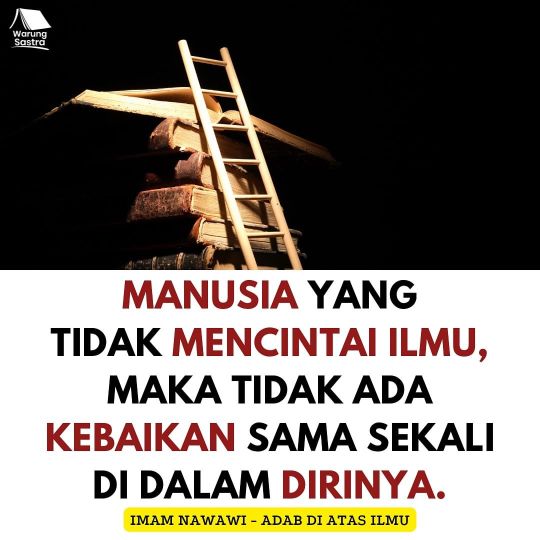
Sepintar apa pun seseorang, namun ia tidak memiliki adab, gugurlah nilai semua pengetahuannya; tak dapat dijadikan rujukan, takkan pula memproduksi kebaikan-kebaikan. Bahkan amal-amal ibadahnya pun tak bernilai apa-apa bila tidak dihiasi dengan adab.
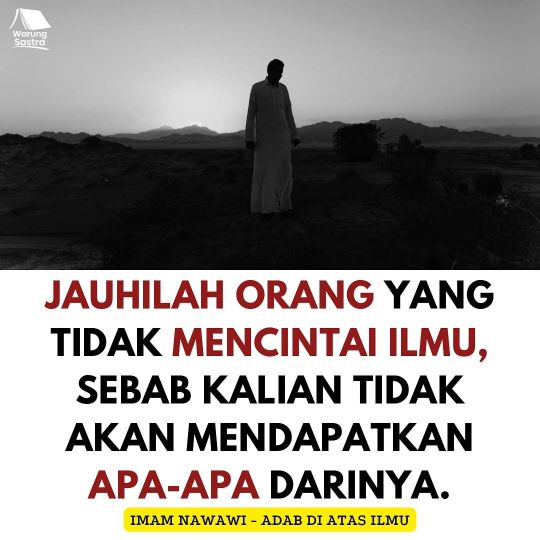
Adab di atas ilmu.
#adab#ilmu#iptek#pintar#jenius#cerdas#intelektual#iq#otak#imam nawawi#universitas#attitude#mental health#eq#sq#spiritual#agama#etika#moral#quote#quotes#positif#motivasi#islamic quotes#islamicreminder#reminder#selfreminder#self improvement#self awareness#positive vibes
11 notes
·
View notes
Text
Ei verdig studietid
Tidlegare har eg skrevet om studentane sine kår, og at dei må betrast. Eg står framleis for det eg skreiv, og skriv sikkert ein artikkel til. Titlane under fører til artiklane:
Delttidsjobben er ikkje eit valt avbrekk (03/2022)
Hugs at du skal ut i arbeid, student (10/2022)
Det å vere student er meir enn berre det du lærer på undervisningsbenken, ein fest, og deltidsjobben på Rema 1000. Krev endring, student!
2 notes
·
View notes
Text
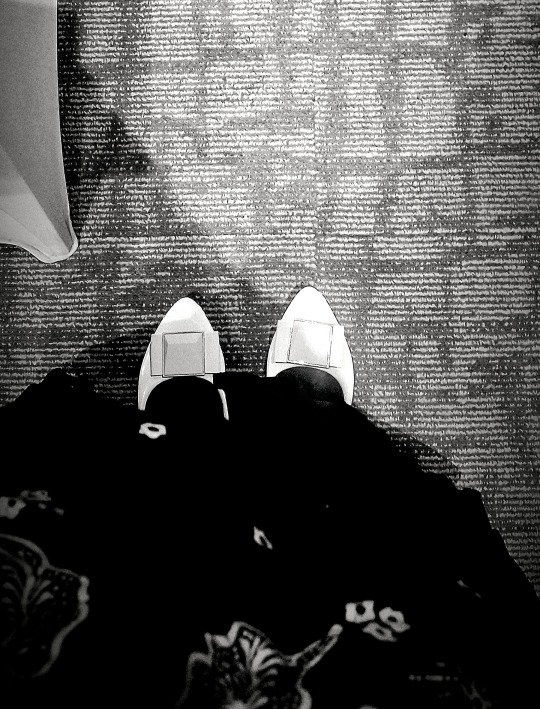
2 tahun setengah yang tidak mudah
ustadzah mohon diterima ya, dan wajib dipakai saat wisuda kita besok. ini kenang kenangan dari kami, terimakasih sudah membersamai selama ini. angkatan 56 Smamsatu Gresik Program MBS
Surat terbuka ini ustadzah tulis untuk kalian anak anak yang kami bersamai selama 2 setengah tahun pada program MBS Smamsatu Gresik. masih ingat hari itu di Awal bulan Ramadhan tahun 2021, aku diamanahi untuk membersamai kalian.
waktu itu ustadzah masih ingat ada yang menangis karena belum terbiasa jauh dari keluarga, belum ada teman dan penyesuaian penyesuaian lainnya yang membuat kalian tidak nyaman. waktu itu diri ini masih belajar bagaimana menghadapi remaja remaja seperti kalian yang masih ingin mencari kebebasan di luar yang tiba tiba dibatasi dengan begitu banyak peraturan.
belum lagi ustadzah harus belajar berkomunikasi agar kalian nyaman dengan diri ini, nak kalian tau menjadi sosok pendengar yang baik dan pemberi nasihat adalah PR besar bagi diri ini, dibesarkan di lingkungan act of service, membuat ustadzah tidak banyak diberi pujian, dan jarang berkomunikasi dengan orang sekitar. berkat kalian sedikit banyak diri ini berubah meski masih banyak kekurangannya.
mendidik sesama tulang rusuk membuat ustadzah menurunkan ego serendah mungkin, tetap tersenyum saat marah, tetap gembira di saat gemuruh hati begitu riuh berkat drama drama yang kalian timbulkan, sesekali merasa apa yang diusahakan untuk kalian kurang maksimal sehingga sedikit banyak mengecewakan orangtua yang mempercayakan amanah kepada diri ini.
belum lagi masukan dari berbagai sisi terhadap kinerja diri, mulai dari orangtua, pimpinan, warga sekolah bahkan kalian sendiri membuat ustadzah berpikir apakah mundur saja dari amanah ini, dibentuk dengan disiplin tinggi kadang membuat ustadzah untoleran terhadap apa apa yang kalian langgar dari tata tertib.
tapi ternyata 2,5 tahun itu berlalu di bulan ini kalian resmi menjadi Alumni, ada yang sudah diterima di perguruan tinggi yang diimpikan ada juga yang masih berikhtiar, yakinlah anak anakku apapun nanti yang Allah berikan pasti akan ada kebaikan kebaikan untuk kalian, diri ini akan terus mendoakan kebaikan untuk kalian.
terimakasih atas segala kenangan yang diberikan dan hadiah sepatu yang sangat indah, doakan sepatu yang kalian berikan mampu menemani ustadzah untuk terus berbagi kebaikan, sehingga kalian juga mendapatkan kebaikan dari apa yang diri ini lakukan.
terimakasih 2,5 tahunnya meski banyak air mata semoga kebaikan selalu menyertai kita semua
untuk anak anakku kelas 12 Program MBS Smamsatu Gresik Angkatan 56
Gresik, 3 Juni 2023
Sazzadiyatan
6 notes
·
View notes
Text
Forum Komunikasi Guru Besar Dan Dosen Putera Puteri Brebes Santuni Warga Terdampak Banjir
Tukang Becak 8 Desa di 5 Kecamatan terdampak Banjir Mendapat Bantuan dari Profesor Brebes Beritalidik.com ( Brebes ) Forum Komunikasi Guru Besar Dan Dosen Putera Puteri Brebes / Yayasan Rumah Cinta Brebes membantu terdampak banjir Brebes. Sabtu ( 25 /01/2025 ) Curah hujan tinggi di wilayah selatan hulu Sungai Pemali, Brebes, Jawa Tengah, mengakibatkan air sungai meluap dan merendam ribuan rumah…
#Banjir#Banjir Brebes#Beras#Bidan#Brebes#Camat#Desa#dukuhwringin#Forum#Jakarta#Jawa Tengah#Kecamatan#Kersana#korban banjir#Lingkungan hidup#Masyarakat#Pebatan#Pemerintah#Pendidikan#PTSL#Rumah#santunan#Sekolah#SErtifikat#Tanah#Trayeman#Tukang becak#Universitas
0 notes
Text
Pohon Kenangan di Tepian Kampus
Cerita ini adalah refleksi pengabdian sekelompok dosen, dengan filosofi bahwa dalam perpisahan sekalipun, selalu ada benih harapan yang dapat dipanen menjadi sesuatu yang indah. Sebuah cerita fiksi dari penulis dan mungkin sedikit ada kesamaan dengan dunia nyata. Di sebuah kampus kecil yang penuh semangat di sudut kota Jakarta, sekelompok dosen muda dan pemula dari berbagai program studi. Kampus…
0 notes
Text
Biaya kuliah Universitas Strada
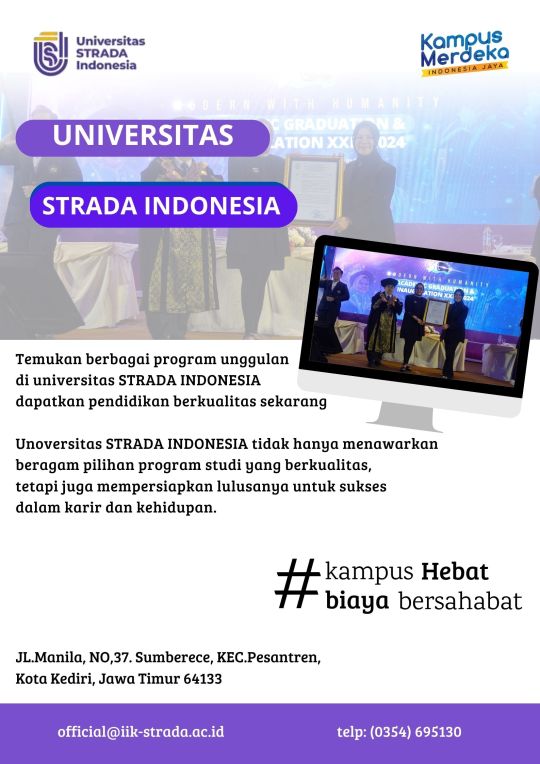
UNIVERSITAS STRADA adalah salah satu perguruan tinggi yang terus berkomitmen untuk menyediakan pendidikan berkualitas dengan fokus pada bidang kesehatan dan manajemen. Lokasinya yang strategis di Jl. Manila, No. 37, Sumberece, Kec. Pesantren, Kota Kediri, Jawa Timur 64133, menjadikan universitas ini mudah dijangkau oleh calon mahasiswa dari berbagai daerah di Indonesia. Bagi calon mahasiswa yang ingin mengetahui rincian lebih lanjut mengenai universitas ini, kontak dapat dilakukan melalui Telp: (0354) 695130, Handphone: +62 811-3500-876, atau email di [email protected]. Selain itu, UNIVERSITAS STRADA juga aktif di media sosial, seperti Instagram: @universitasstrada dan YouTube: Strada Tv.
Salah satu aspek penting yang sering menjadi perhatian calon mahasiswa adalah biaya kuliah. Di UNIVERSITAS STRADA, biaya kuliah dirancang untuk tetap terjangkau dengan mempertimbangkan kualitas pendidikan yang diberikan. Biaya tersebut bervariasi tergantung dari prodi atau program studi yang dipilih oleh mahasiswa. Adapun beberapa program studi unggulan yang tersedia di universitas ini, antara lain D3- Kebidanan, S1 & Profesi Kebidanan, S1 & Profesi Keperawatan, S1- Ilmu Kesehatan, S1- Administrasi Rumah Sakit, S1- Farmasi, S1- Radiologi, S1- Bisnis Digital, dan S1- Manajemen Ritel.
Secara umum, biaya kuliah di UNIVERSITAS STRADA terdiri dari beberapa komponen. Pertama adalah biaya pendaftaran yang harus dibayarkan pada saat mendaftar sebagai calon mahasiswa. Biaya ini merupakan tahap awal yang perlu diperhatikan sebelum mahasiswa dapat memulai perkuliahan. Selain itu, terdapat pula biaya SPP (Sumbangan Pembinaan Pendidikan) yang dibayarkan setiap semester. SPP ini mencakup biaya perkuliahan, penggunaan fasilitas, serta dukungan akademik lainnya yang akan diterima mahasiswa selama menempuh pendidikan di universitas.
Untuk program studi D3- Kebidanan, yang merupakan salah satu pilihan populer, biaya kuliahnya relatif terjangkau. Program ini bertujuan untuk menghasilkan tenaga bidan yang kompeten dalam memberikan layanan kesehatan ibu dan anak. Selain itu, mahasiswa di program ini juga diajarkan keterampilan klinis yang aplikatif, sehingga lulusan siap menghadapi tantangan di dunia kerja. Tentu saja, biaya pendidikan di sini disesuaikan dengan kualitas pembelajaran dan pelatihan yang diterima mahasiswa.
Program studi S1 & Profesi Kebidanan dan S1 & Profesi Keperawatan juga menawarkan biaya kuliah yang kompetitif. Kedua program ini memiliki kurikulum yang dirancang secara khusus untuk memenuhi kebutuhan industri kesehatan. Mahasiswa akan mendapatkan pengalaman praktik yang luas di berbagai rumah sakit dan klinik, yang merupakan bagian dari upaya UNIVERSITAS STRADA dalam menyiapkan lulusan yang siap kerja. Biaya yang dibutuhkan untuk menempuh program ini sudah mencakup pembelajaran teori dan praktik, serta pelatihan yang bersifat komprehensif.
Bagi yang tertarik di bidang manajemen pelayanan kesehatan, program S1- Administrasi Rumah Sakit juga memiliki struktur biaya yang sesuai dengan layanan pendidikan berkualitas yang diberikan. Program ini menekankan pada pengelolaan rumah sakit dan fasilitas kesehatan lainnya, yang semakin penting di tengah perkembangan sektor kesehatan di Indonesia. Biaya pendidikan di sini mencakup pembelajaran manajemen, sistem informasi rumah sakit, serta keterampilan manajerial lainnya yang akan membantu lulusan untuk menjalankan tugasnya dengan baik di lingkungan rumah sakit.
Di bidang farmasi, program S1- Farmasi juga menjadi pilihan menarik dengan biaya kuliah yang dirancang agar dapat diakses oleh berbagai kalangan. Program ini mempersiapkan mahasiswa untuk menjadi ahli di bidang farmasi, yang mampu menangani berbagai aspek terkait obat-obatan dan terapi medis. Selain teori yang mendalam, mahasiswa juga akan mendapatkan pengalaman praktik yang cukup intensif. UNIVERSITAS STRADA memastikan bahwa setiap biaya yang dikeluarkan mahasiswa akan sebanding dengan manfaat yang mereka terima selama proses pendidikan.
Selain itu, S1- Radiologi juga menawarkan biaya kuliah yang bersaing, mengingat tingginya biaya teknologi medis yang digunakan dalam pembelajaran. Program ini membekali mahasiswa dengan kemampuan untuk mengoperasikan berbagai alat diagnostik seperti sinar-X, CT scan, dan MRI. Mahasiswa akan mendapatkan akses ke laboratorium berteknologi tinggi, yang tentu saja menjadi salah satu faktor dalam penentuan biaya kuliah.
Di luar bidang kesehatan, UNIVERSITAS STRADA juga menyediakan program S1- Bisnis Digital dan S1- Manajemen Ritel, yang sangat relevan dengan perkembangan ekonomi digital saat ini. Kedua program ini memiliki biaya kuliah yang cukup kompetitif, terutama mengingat bahwa lulusan dari program ini sangat dibutuhkan di dunia usaha yang semakin mengarah pada transformasi digital. Program S1- Bisnis Digital mempersiapkan mahasiswa untuk menjadi pengusaha atau manajer yang mampu mengelola bisnis di era digital, sementara S1- Manajemen Ritel fokus pada pengelolaan bisnis ritel yang saat ini menjadi salah satu sektor penting dalam ekonomi global.
Untuk jenjang yang lebih tinggi, UNIVERSITAS STRADA juga menawarkan program magister seperti S2- Kesehatan Masyarakat dan S2- Keperawatan. Program magister ini ditujukan bagi mereka yang sudah berkarier di bidang kesehatan dan ingin meningkatkan kompetensi mereka. Biaya kuliah untuk program magister ini disesuaikan dengan tingkat pendidikan yang lebih tinggi, serta mencakup berbagai fasilitas akademik yang lebih eksklusif, seperti bimbingan intensif dari dosen ahli, serta akses ke laboratorium riset.
Selain biaya kuliah reguler, UNIVERSITAS STRADA juga memberikan berbagai kesempatan beasiswa bagi mahasiswa berprestasi atau yang memiliki keterbatasan finansial. Beasiswa ini diharapkan dapat membantu meringankan beban biaya kuliah, sehingga pendidikan tetap dapat diakses oleh semua kalangan. Universitas ini terus berkomitmen untuk mendukung mahasiswa dalam mencapai pendidikan terbaik tanpa harus khawatir dengan kendala biaya.
Selain aspek biaya, UNIVERSITAS STRADA juga memastikan bahwa setiap lulusan dipersiapkan dengan baik melalui konsep 4G STRADA: Good Competence, Good Mentality and Personality, Good English, dan Good Placement Preparation. Keempat karakter ini menjadi pondasi dalam mencetak lulusan yang siap bersaing di kancah internasional. Dengan biaya kuliah yang terjangkau dan kurikulum yang dirancang untuk menghadapi tantangan global, UNIVERSITAS STRADA terus menjadi pilihan yang tepat bagi mereka yang ingin meniti karier di bidang kesehatan maupun bisnis.
Bagi calon mahasiswa yang tertarik untuk mendaftar atau mendapatkan informasi lebih lanjut mengenai biaya kuliah, pendaftaran dapat dilakukan melalui website resmi www.strada.ac.id. Di website ini, calon mahasiswa dapat mengakses informasi lengkap mengenai persyaratan pendaftaran, biaya kuliah, serta berbagai program studi yang ditawarkan. Selain itu, universitas ini juga menyediakan berbagai layanan dukungan akademik dan fasilitas pendidikan yang memadai, termasuk laboratorium, perpustakaan, dan fasilitas praktik yang dirancang untuk menunjang proses belajar-mengajar.
UNIVERSITAS STRADA tidak hanya berfokus pada pendidikan akademik, tetapi juga memberikan perhatian khusus pada pengembangan karakter mahasiswa. Dengan fasilitas modern, kurikulum yang up-to-date, serta biaya yang kompetitif, universitas ini menjadi pilihan tepat bagi mereka yang mencari pendidikan berkualitas di Indonesia.
0 notes
Text
Pakar Hukum Minta Kejagung Periksa Ketua Mahkamah Agung di Kasus Zarof Ricar
JAKARTA, Cinews.id – Pakar hukum pidana Universitas Trisakti, Abdul Fickar Hadjar mengatakan, tindakan Kejagung yang melakukan pemblokiran sejumlah rekening terkait dengan ZR harus dilakukan secara cepat dan menyeluruh, terlebih lagi banyak hakim di berbagai daerah yang diduga terlibat dalam jual beli perkara. “Karena sudah jelas kedudukan ZR sebagai makelar kasus baik ketika aktif sebagai…
1 note
·
View note
Text
Fasilitas Olahraga di Universitas STRADA yang Mendukung Gaya Hidup Sehat
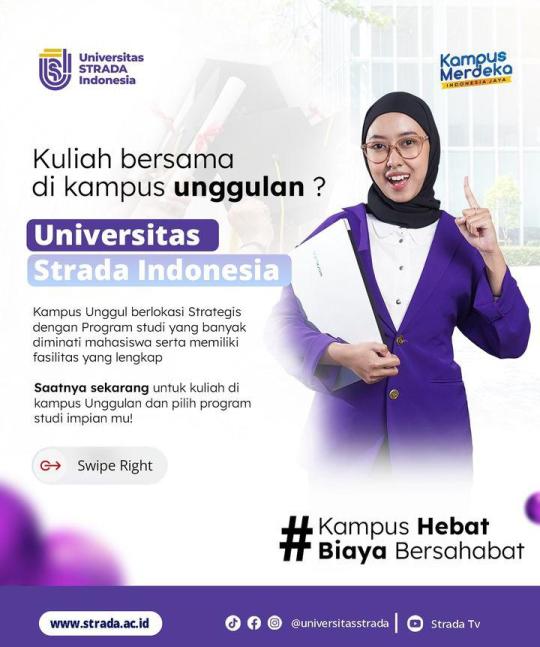
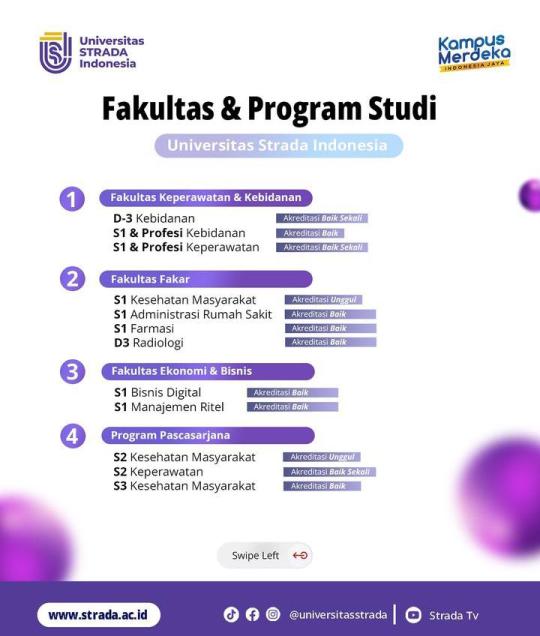
Pendidikan tinggi tidak hanya berfokus pada aspek akademik, tetapi juga pada pengembangan diri secara menyeluruh, termasuk kesehatan fisik. Universitas STRADA menyadari pentingnya menjaga kesehatan dan kebugaran mahasiswanya. Oleh karena itu, kampus ini menyediakan fasilitas olahraga terbaik yang dirancang untuk mendukung gaya hidup sehat. Berikut adalah penjelasan mengenai fasilitas olahraga yang ada di Universitas STRADA dan bagaimana hal ini berkontribusi terhadap kesejahteraan mahasiswa.1. Lapangan Olahraga yang LengkapSalah satu fitur utama dari fasilitas olahraga Universitas STRADA adalah keberadaan lapangan olahraga yang lengkap. Terdapat lapangan sepak bola, basket, dan voli yang dapat digunakan oleh mahasiswa untuk berlatih atau bersenang-senang bersama teman. Lapangan-lapangan ini dirawat dengan baik, sehingga menciptakan kondisi yang ideal untuk berolahraga.Keberadaan lapangan ini tidak hanya menjadi tempat untuk berolahraga, tetapi juga menjadi sarana interaksi sosial di antara mahasiswa. Berbagai kegiatan, seperti turnamen antarkelas dan kompetisi olahraga, sering diadakan di sini, mendorong semangat tim dan kerja sama di antara mahasiswa.2. Pusat Kebugaran yang ModernUniversitas STRADA juga dilengkapi dengan pusat kebugaran yang modern dan lengkap. Dengan berbagai peralatan olahraga terkini, mahasiswa dapat melakukan berbagai macam latihan, mulai dari angkat beban hingga latihan kardiovaskular. Pusat kebugaran ini dirancang untuk memenuhi kebutuhan semua mahasiswa, baik yang ingin menjaga kebugaran, menurunkan berat badan, maupun yang ingin membangun massa otot.Selain itu, pusat kebugaran ini juga menawarkan program pelatihan dan kelas kelompok yang dipandu oleh instruktur berpengalaman. Hal ini memberikan mahasiswa kesempatan untuk berlatih dengan teknik yang benar dan mendapatkan bimbingan dalam mencapai tujuan kebugaran mereka.3. Ruang Serbaguna untuk Aktivitas OlahragaSebagai tambahan, Universitas STRADA memiliki ruang serbaguna yang dapat digunakan untuk berbagai aktivitas olahraga. Ruangan ini dapat disesuaikan untuk kegiatan seperti senam, yoga, atau bahkan pelatihan bela diri. Fasilitas ini memberi mahasiswa fleksibilitas dalam memilih jenis olahraga yang ingin mereka lakukan, sesuai dengan minat dan kebutuhan masing-masing.Ruang serbaguna ini juga sering digunakan untuk kegiatan ekstrakurikuler, seperti klub olahraga dan kelas kebugaran. Hal ini memungkinkan mahasiswa untuk terlibat dalam kegiatan yang meningkatkan kesehatan fisik sekaligus memperluas jaringan sosial mereka.4. Kegiatan Olahraga dan Acara RutinUniversitas STRADA aktif mengadakan berbagai kegiatan olahraga dan acara rutin untuk meningkatkan minat mahasiswa terhadap olahraga. Event-event seperti festival olahraga, lomba lari, dan pertandingan antarkampus menjadi kesempatan bagi mahasiswa untuk menunjukkan bakat dan keterampilan mereka.Kegiatan ini tidak hanya memberikan pengalaman berharga, tetapi juga membangun rasa kebersamaan dan solidaritas di antara mahasiswa. Dengan mengikuti berbagai kompetisi, mahasiswa dapat belajar tentang sportivitas dan pentingnya kerja keras untuk mencapai tujuan.
0 notes
Text
Sistem Pembelajaran Inovatif di Universitas Strada Indonesia

Pendidikan merupakan salah satu pilar penting dalam menciptakan generasi yang cerdas dan siap menghadapi tantangan global. Sistem pembelajaran UNIVERSITAS STRADA INDONESIA mengadopsi pendekatan inovatif yang dirancang untuk mengoptimalkan potensi setiap mahasiswa. Terletak di Jl. Manila, No. 37, Sumberece, Kec. Pesantren, Kota Kediri, Jawa Timur 64133, universitas ini berkomitmen untuk menyediakan pengalaman belajar yang tidak hanya teoritis, tetapi juga praktis dan aplikatif.
Pendekatan Pembelajaran Berbasis Kompetensi
Salah satu keunggulan dari sistem pembelajaran di UNIVERSITAS STRADA INDONESIA adalah penerapan pendekatan berbasis kompetensi. Metode ini memungkinkan mahasiswa untuk mengembangkan keterampilan yang relevan dengan dunia kerja. Dalam prosesnya, mahasiswa diajak untuk berpartisipasi aktif, berdiskusi, dan terlibat dalam proyek nyata yang berkaitan dengan bidang studi mereka.
Pengembangan Keterampilan Praktis
Setiap program studi, baik D3- Kebidanan, S1 & Profesi Kebidanan, S1 & Profesi Keperawatan, maupun program lainnya, dirancang dengan mempertimbangkan kebutuhan industri. Misalnya, pada program S1- Ilmu Kesehatan, mahasiswa tidak hanya belajar teori, tetapi juga diberikan kesempatan untuk berpraktik di fasilitas kesehatan terkemuka. Hal ini menjadi salah satu bentuk komitmen universitas dalam mempersiapkan lulusan yang siap kerja.
Integrasi Teknologi dalam Pembelajaran
Sistem pembelajaran UNIVERSITAS STRADA INDONESIA juga mengintegrasikan teknologi informasi dalam proses belajar mengajar. Penggunaan platform e-learning memudahkan mahasiswa untuk mengakses materi kuliah, melakukan diskusi daring, dan mengikuti ujian secara online. Selain itu, dengan adanya YouTube yang dikelola oleh universitas, mahasiswa dapat memperoleh materi tambahan yang mendukung pemahaman mereka.
Pembelajaran Kolaboratif
Selain teknologi, pendekatan pembelajaran kolaboratif juga diterapkan. Mahasiswa didorong untuk bekerja dalam kelompok, berbagi pengetahuan, dan mengembangkan ide-ide kreatif. Dalam konteks ini, sistem pembelajaran tidak hanya fokus pada pencapaian akademis, tetapi juga membangun karakter dan kepribadian mahasiswa. Hal ini sejalan dengan karakter 4G STRADA yang diusung oleh universitas, yaitu Good Competence, Good Mentality and Personality, Good English, dan Good Placement Preparation.
Keterlibatan Dunia Industri
UNIVERSITAS STRADA INDONESIA menjalin kemitraan yang erat dengan berbagai institusi dan industri. Kolaborasi ini memberikan mahasiswa akses langsung ke dunia kerja dan memperluas jaringan profesional mereka. Program magang dan kunjungan industri adalah beberapa bentuk keterlibatan yang dilakukan, sehingga mahasiswa bisa melihat secara langsung aplikasi ilmu yang mereka pelajari.
Pengalaman Internasional
Dalam upaya untuk meningkatkan daya saing global, universitas juga menawarkan program pertukaran pelajar dan kerjasama internasional. Hal ini memberikan kesempatan bagi mahasiswa untuk belajar di luar negeri dan mendapatkan pengalaman yang lebih luas. Lulusan yang memiliki pengalaman internasional tentu memiliki nilai tambah di mata calon pemberi kerja.
Lingkungan Belajar yang Mendukung
UNIVERSITAS STRADA INDONESIA tidak hanya berfokus pada aspek akademis, tetapi juga menciptakan lingkungan belajar yang kondusif. Fasilitas modern, ruang belajar yang nyaman, dan akses ke sumber daya belajar yang lengkap menjadi prioritas. Universitas juga menyediakan berbagai kegiatan ekstrakurikuler yang dapat meningkatkan soft skills mahasiswa, seperti kepemimpinan, kerjasama tim, dan manajemen waktu.
Bimbingan Karir
Dukungan terhadap mahasiswa tidak berhenti pada proses pembelajaran. UNIVERSITAS STRADA INDONESIA menyediakan layanan bimbingan karir yang membantu mahasiswa merencanakan dan mempersiapkan karir mereka. Melalui seminar, pelatihan, dan konsultasi individu, mahasiswa dibekali dengan strategi yang efektif untuk memasuki dunia kerja.
Kesimpulan
Dengan sistem pembelajaran yang inovatif, UNIVERSITAS STRADA INDONESIA telah menunjukkan komitmennya dalam menciptakan lulusan yang berkualitas dan siap bersaing di pasar kerja. Melalui pendekatan berbasis kompetensi, integrasi teknologi, dan keterlibatan dunia industri, mahasiswa tidak hanya mendapatkan pengetahuan teoritis tetapi juga keterampilan praktis yang sangat dibutuhkan. Dengan bekal Good Competence, Good Mentality and Personality, Good English, dan Good Placement Preparation, lulusan universitas ini akan menjadi tenaga profesional yang mampu berkontribusi secara signifikan dalam masyarakat.
Untuk informasi lebih lanjut mengenai program studi dan fasilitas yang ditawarkan, silakan kunjungi website resmi UNIVERSITAS STRADA INDONESIA di www.strada.ac.id, atau ikuti Instagram di @universitasstrada dan YouTube di Strada Tv untuk mendapatkan update terkini.
0 notes
Text
La tarde de ayer, el Presidente Municipal, Cruz Pérez Cuéllar, asistió a la ceremonia de graduación de 469 estudiantes de la Universidad Autónoma de C...
0 notes
Text
Kita tidak membayar pajak—mereka 'majakin' kita 🤭
#ahok#basuki tjahaja purnama#jakarta#kolonialisme#korupsi#kkn#kolusi#nepotisme#pajak#pajak kendaraan#instansi pemerintah#pemerintahan#program pemerintah#asing#politik#indonesia#nusantara#demokrasi#quotes#quote#literasi#pendidikan#universitas#sembako#kutipan#kata bijak#positif#lowongan kerja#buruh#pemimpin
2 notes
·
View notes
Text
Gracias de antemano por sus comentarios Llevan la navidad al suroriente de la ciudad La Universidad realizó un festival musical en el Centro Comunitario UACJ. Ciudad Juárez, Chih. (UACJ) -Con música y danza, la Universidad Autónoma de Ciudad Juárez (UACJ) realizó el Festival Navideño 2021 en su Centro Comunitario, ubicado en el fraccionamiento Cerradas del Sur etapa 3, al suroriente de la ciudad. El apoyo de 21 estudian... Sigue leyendo: https://www.adiario.mx/universitas/llevan-la-navidad-al-suroriente-de-la-ciudad/?feed_id=174361&_unique_id=66f234b126795
0 notes
Text
Supplier Toga Wisuda Universitas Kualitas Premium Grosir
Supplier Toga Wisuda Universitas Kualitas Premium Grosir | 0852-8008-4081 Wisuda merupakan salah satu momen penting yang selalu dinantikan oleh setiap mahasiswa. Sebagai simbol pencapaian akademis, penggunaan toga wisuda menjadi bagian yang sangat berkesan dalam upacara kelulusan. Bagi universitas yang rutin mengadakan acara wisuda, memilih toga wisuda berkualitas premium adalah keharusan. Di…

View On WordPress
#jual toga wisuda universitas#supplier toga wisuda grosir#supplier toga wisuda universitas#Toga wisuda#toga wisuda grosir#toga wisuda kualitas premium#universitas
0 notes
Text
Suprawoto Hadir di Peresmian Akbar Kampus 5 Unesa, Inisiator Kampus di Magetan
MAGETAN | INTIJATIM.ID – Ada sejarah terkait berdirinya Kampus Unesa di Magetan. Salah satunya adalah Suprawoto, atau dikenal dengan sebutan Kang Woto”. Mantan Bupati periode 2018-2023 ini termasuk orang yang berjasa atas berdirinya Kampus 5 Unesa Magetan yang hari ini diresmikan?. Pun, diundang dalam acara Peresmian Akbar Kampus 5 Unesa Magetan. Suprawoto menginisiasi lahirnya kampus Unesa di…
1 note
·
View note
Text
Waspada, komunitas LGBT Makassar manfaatkan Jumat berkah untuk kampanye terselubung
MAKASSAR (Arrahmah.id) – Sekelompok pemuda yang tidak diketahui identitasnya membagikan snackbox dengan beberapa aksesoris yang memuat pesan dukungan kepada kaum LGBT (Lesbian, Gay, Biseksual, dan Transgender). Kampanye LGBT dengan sistem pembagian snackbox itu ditemukan di beberapa kampus di Kota Makassar pada Jumat (28/6/2024). Para pemuda tersebut memanfaatkan momen Jumat berbagi saat…

View On WordPress
0 notes